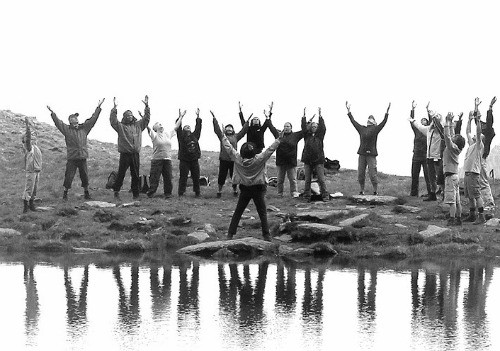Part 6e of my Magic Test of Seven
My review of the book: The Happiness Quest from Lana Pelrose
I believe this book is a fantastic read for anyone; whether you suffer from depression, know someone who does or are just interested in putting yourself in someone else’s shoes.
Lana writes very honest, details her story meticulously with a dose of humor that is unlike the topic. And that poignant humor is exactly spot on, as this is what makes the topic a lot lighter than it exactly is.
Depression is a very serious illness that destroys many lives. In more ways than we can even imagine. Just a couple of months ago, a Germanwings pilot took down an entire plane with him. But it also destroys the everyday happiness of those that do hang on somehow.
It’s time to put the topic of depression, more prominently on the table and no longer hide it in the closet. Lana does this in an extremely heartwarming manner, by telling her personal story. A real drama, on a real live stage. Highly emotional and turbulent but with a happy end.
Lana shows there is a way out and you can find true happiness again. It’s at your fingertips, even if those, at times, may feel very far away.
I loved, how the book started off, listing all the things Lana felt she could try out, to then decide, to try them all. In an A-Z summary, she takes her readers through all the therapies that are out there and rates how helpful they’ve been. She judges them, not only from her own personal perspective, but puts them in a larger context and aims to truly help the writer that is looking for advice.
Everyone will have to find their own personal way out. Lana just shows it’s possible.
One of the reviews I read criticized: “The one thing that did annoy me about this book, which stopped me from giving it 4 stars, was that the emotion was too overwrought at times and repetitive – the author labored the point too many times when it came to describing her emotional states.” I don’t agree with this statement. To me exactly the fact that certain emotions repeat is what makes this book real-live. That is how many people go through depression. With days that are ok and days that are absolutely not. Phase, after phase, after phase. It’s a constant battle even for the strongest minds, those that know how to do self-talk extremely well yet just cannot reach their own heart with it.
That’s how I felt when I read this book. For someone that has never experienced depression, it’s so hard to understand how bright, brave and beautiful people can still find it so extremely hard to influence their own state of being. The human brain has a phenomenal capacity to make our own lives miserable. On the bright side, it also has the capacity to make us strong and resilient and kind.
Bottom line, happiness is a choice we make, but the reality is we all struggle with that all times. Some more, some less, and some to a degree that is no longer healthy.
Made me think of the powerful poem Ulysses from Alfred Tennyson that ends with “To strive, seek find and not to yield”. Our will to survive is strong. The happiness Quest gives hope that the will to survive, will make us survive, and there is light at the end of any tunnel.
Here (ad random) a few passages from the book that I copied in my notebook:
“Studies had shown that happier people were usually healthier, lived longer and were immersed in their community with respect to the latter. I wasn’t – at all – and it got me wondering if the chasm between dogooders and people locked indoors Facebooking or playing second life somehow contributed to the prevalence of depression today. To my mind, despite the miracle of the Internet, the human race seemed more disconnected.”
“I was beyond overwhelmed. So many creative minds trapped within torture chambers, and so many of them within my own backyard. I vowed to return to philanthropy once I figured out what I had to offer, if anything.”
At some point, she has a phone conversation with B. Alan Wallace.
‘Lana, even though we think about many things, they’re not worth thinking about all the time, so just be present. Breath in, breath out. Let it flow like a wave washing upon as shore. Watch your thoughts as though observing a flame flickering in a heart. Let go and come into the present. In this way, your whole system will come to a state of ease. You’ll feel soft, warm and relaxed, as though being tenderly held in a pair of loving arms.’
“I could continue to hearing directives like these until the cows came home, but unless I got the hang of it, they’d remain just words.” ‘The state you sometimes find yourself in doesn’t perpetuate all by itself. You help it along, which is why it continues. But you can break with the cycle by deeply relaxing. Meditation enhances the psychological immune system and assists the mind in being less prone to falling into irritation, impatience, anxiety, craving and a myriad of other imbalances. It dredges the psyche. It’s a spectacular practice.”
‘There is nothing particular esoteric about it, Lana, yet it’s very deep. Its dept is not in my words. It’s in the potential of your own body and mind to balance things out. It’s a tool that you already have at your disposal. It’s acknowledging that your mind has the extraordinary capacity to heal itself. ‘For the moment what we attend to is reality. When we slip into depression and the world locks bleak, if we attend to that, then that’s our reality.’ ‘Pardon me for the truism’, he continued, but depression isn’t helping anyone, Lana. It’s not helping one’s self, and it’s not helping others. Many are missing out on so much goodness that is taking place in this world.’ ‘There is so much virtue, altruism, benevolence and hope surrounding us. You can’t count the number of people in your city alone who are just trying to be good people; mothers, fathers, teachers, those working in cafeterias or behind cash registers. They’re being decent, trying to help out in their own small ways. And there are occasions where we witness wonderful virtue too, when people show great heroism, kindness, generosity and wisdom. That’s a time for joy, Lana. Seek to cultivate a heart that is open to wishing everyone well.”
‘Something that we in our modern culture give ourselves very little allowance to do is sit back and take satisfaction in our own virtues – the goodness we’re bringing to the world. It’s not egotism. It’s not narcissism. It’s not self-congratulation. It’s taking delight in our deeds. It’s just as authentic to take delight in other people’s benevolence as it is to take delight in our own. This is the shift in worldview that I’m talking about and if it doesn’t happen, I don’t think any kind of meditation or psychopharmaceutical drug is going to have a very deep impact when it comes to enjoying sustained clarity.”
Lana’s summary: ‘In order to employ meaningful, lasting change, I needed to shift my worldview, focus on a more positive reality, be in the moment, meditate, and be aware of how I spoke and interacted with others.
“1990’s at the request of the Dalai Lama neuroscientist Prof. Richard Davidson conducted a groundbreaking study into the effects of meditation on the human brain. He found that it heightened electrical activity in several areas, incl. the happiness sector. It showed it was possible to train our minds to be happier. In 2013, Prof. Davidson sought to determine how compassion affects the human brain too. After just 30 min, a day for two weeks participants began recruiting stronger brain hemisphere circuits and became kinder, happier, more altruistic, and had greater ability to give and receive love.”
“Apparently, I was filtering bits of life that were flying at me by the millisecond, and my happiness levels were dependent upon what I kept and what I discarded.”
I would love to see a German translation of this book. I know a few people I would like to give it to . . .


